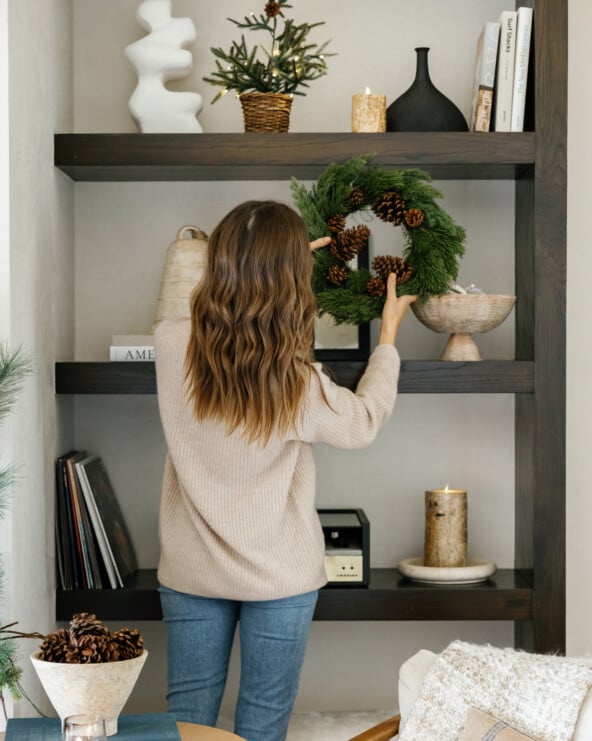This is one of those posts that I decided to write mainly because I needed to read it. For years, one of my New Years resolutions has been to become a better listener, yet it still ends up being one of the things that I consistently struggle with the most. Far too often when I’m in conversation, I accidentally end up replaying events from the day, thinking about my to-do list, or getting distracted by the buzz of my phone.
Yes, it’s unintentional, but there’s a quote that says, “The first duty of love is to listen,” and there’s not a doubt in my mind that being a good listener is one of the most powerful ways we can show others that we really care about them.
Plus we’ll learn so much more and have deeper insights if we’re able to truly process what we’re hearing. Since those are things that I definitely want in my own life, I’ve been researching the science-backed ways we can become better listeners – and remove some of the hurdles that get in the way most frequently. Keep reading for the findings that have resonated with me most, and I’d love to hear what’s worked for you in the comments.
1 – Put away your phone.
How can something so straightforward be so hard to put into practice? The simple act of putting your phone out of sight helps you to engage with the world around you. Try it, and notice how you’re suddenly more in the moment, able to see and hear things that you ordinarily wouldn’t notice. As M. Scott Peck said, “You cannot truly listen to anyone and do anything else at the same time.”
2 – Be genuinely curious.
Often, we appear to be listening to others because it’s the socially acceptable thing to do, but our minds are actually a million miles away. I’ve learned that the only way to really become a good listener is to develop a spirit of genuine curiosity. My own mother is the master of this. When I was growing up (and usually chattering constantly), I always knew that she approached our conversations with genuine curiosity. When Mom asked about my school day, she really wanted to know the answer, and the result was that I always opened up about whatever was going on in my life. Let’s cultivate a spirit of curiosity in others’ lives so they can be vulnerable with us.
Another benefit of curiosity is that it helps you suspend judgement of the other person. When you approach a conversation in an effort to truly understand through active listening, you end up asking questions like, “How does that make you feel?” instead of jumping in or becoming defensive. Even if you do disagree in the end, you might find some common ground that allows you to respond with empathy.
3 – Don’t think about your response while the other person is talking.
Stephen R. Covey said, “Most people do not listen with the intent to understand; they listen with the intent to reply.”
This can be a tough one to put into practice, since most of us are conditioned to think about what we’re going to say next as our foremost duty in a conversation. One strategy that’s helped me: paraphrase at least some of what the other person just said before responding. It ensures that I’ve accurately understood them, plus it gives me some time to process and think about my response after they’ve finished speaking.
4 – Pretend you’re going to have to tell someone else about the conversation later on.
This is a cool little mental trick that really works. By telling yourself that you’re going to have to describe the conversation you’re having later, your brain automatically engages in the active listening skills it needs for recall. Instead of thinking about your response, you start processing what the other person is saying so that you can really remember it – which means being alert, engaged, and asking questions.
 photo via lauren scruggs kennedy
photo via lauren scruggs kennedy
5 – Maintain eye contact.
This is something I’ve really been working on this year, and it’s amazing how the simple act of maintaining eye contact with someone throughout our conversation allows me to stay more present. Sometimes before sitting down with another person for a discussion, I’ll remind myself of two simple words: “Show up.” Even though I’m already there physically, just saying this phrase can be a powerful reminder to be ALL there, not drifting around the space of my thoughts.
6 – Wait for the punctuation at the end of the sentence.
Sometimes I find myself getting so anxious to share my own ideas that I tend to jump in before the other person has finished their complete thought – which is really just another way of saying that I’m interrupting. Instead of rushing to state my opinion or suggest solutions, I’m trying to become comfortable with waiting for the pause at the end of the other person’s sentence. By being present and really listening, it tells the other person that you value them enough to take however much time they need to share their thoughts.
I think that most of us would agree that it’s more difficult than it used to be to stay present in the moment; there are so many things competing for our attention, from the constant flow of emails to our overpacked schedules. But I believe that becoming a good listener is worth our continued time and effort. Not only does it communicate love and respect to the people around us, but as Bernard Baruch wisely stated, “Most of the successful people I’ve known are the ones who do more listening than talking.”









